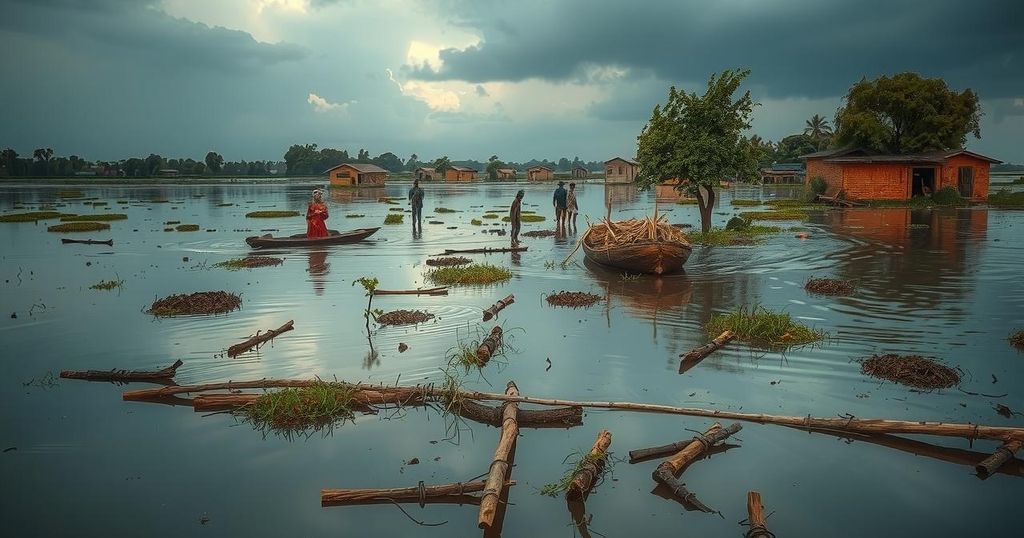Severe Flooding Deepens Health Crisis in South Sudan
South Sudan is experiencing severe flooding leading to the displacement of over 226,000 individuals and widespread damage to health infrastructure. The crisis exacerbates existing health issues, with increasing cases of malaria and suspected cholera. WHO has mobilized resources to provide essential health services to affected communities amid the ongoing humanitarian challenges.
South Sudan is currently grappling with unprecedented flooding, marking some of the worst inundation the country has faced in decades. As of now, over 226,000 individuals have been displaced, with numerous homes and livelihoods severely impacted. This crisis has submerged vital infrastructure, leaving roads and key access routes, including those to the capital city of Juba, incapacitated. Flooding has affected 42 out of the 78 counties, with 58 health facilities completely submerged and approximately 90 others rendered inaccessible due to floodwaters. Altogether, around 890,000 people are at risk within the flood-stricken regions. These extreme floods are largely attributed to heavy rainfall during South Sudan’s rainy season, which occurs from April to November. However, the severity of these flood events has intensified as a consequence of climate change, significantly undermining the resilience of communities and leading to permanent displacements in various areas. The situation concerning public health is dire, exacerbated by the presence of nearly 800,000 refugees and returnees who have escaped violence from neighboring Sudan. In the northern Upper Nile region, for instance, there have been suspected cholera cases reported, alongside rising malaria outbreaks with more than 120,000 cases documented and 31 suspected fatalities as of September 29, 2024. Additionally, there have been 55 reported incidents of snake bites in just five weeks. To address these pressing health challenges, the World Health Organization (WHO) has mobilized to support flood-affected communities by distributing 88 metric tonnes of emergency health kits across regions like Renk, Bentiu, Malakal, and Bor. These health kits are designed to treat over 870,000 individuals and encompass a variety of critical medical supplies, including cholera response kits and antimalarial medications. Furthermore, WHO has coordinated health response efforts with local authorities and has initiated assessments to guide a targeted response to the emerging health emergency. Continued monitoring of health impacts, particularly focusing on vector-borne and water-borne diseases, remains a priority amid the flooding. WHO is actively involved in building climate-resilient health systems across Africa to enhance adaptation to climatic threats, which directly affect health outcomes. Through the establishment of robust operational frameworks and scientific research, WHO aims to address health vulnerabilities induced by climate change and advocate for strategic investments to fortify health systems against future climatic shocks.
The flooding in South Sudan is a catastrophic natural event causing significant humanitarian crises, particularly affecting health systems and community resilience. The underlying factor contributing to the severity of the floods is climate change, which has amplified weather extremes and exacerbated the vulnerability of communities already struggling with limited resources. The confluence of these floods with ongoing conflict situations has resulted in increased displacement, health emergencies, and a surge in communicable diseases, thus presenting a complex health crisis demanding urgent intervention.
In conclusion, South Sudan is facing a severe health crisis compounded by unprecedented flooding, which has displaced over 226,000 individuals and submerged critical health facilities. The WHO is actively responding to the crisis through emergency health assistance and collaboration with local authorities. The interplay of climate change, ongoing conflict, and the influx of refugees poses profound challenges to public health, necessitating enhanced resilience in health systems to combat future emergencies effectively. The current situation highlights the urgent need for coordinated humanitarian efforts and sustainable investments in health infrastructure to safeguard vulnerable populations.
Original Source: www.afro.who.int




Post Comment